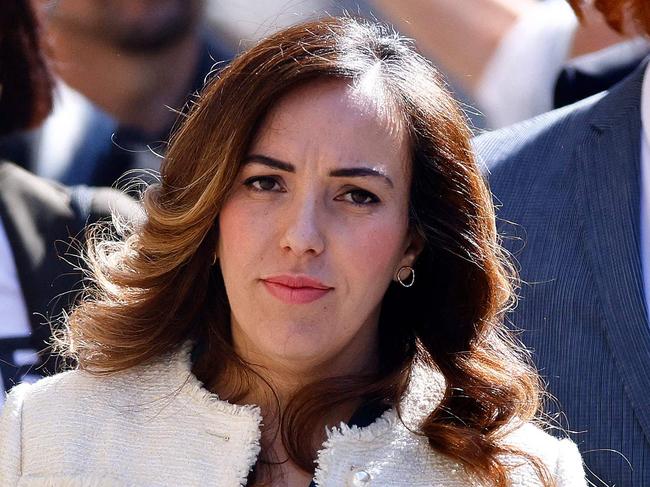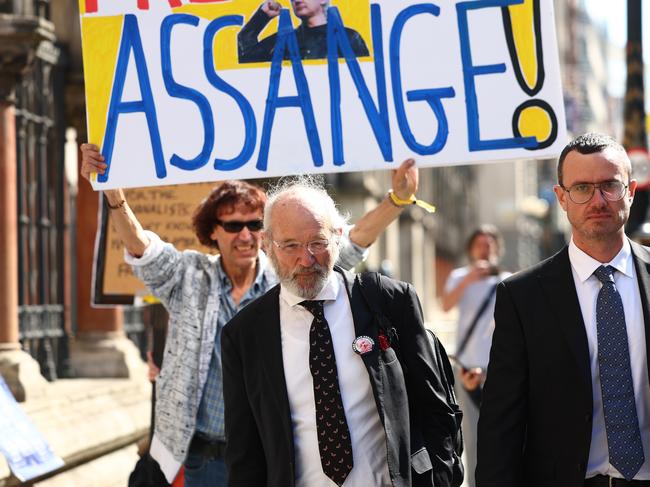Julian Assange wins bid to appeal US extradition ruling: UK judges
Two London High Court judges have granted Julian Assange permission to appeal extradition to the United States.
World
Don't miss out on the headlines from World. Followed categories will be added to My News.
WikiLeaks founder Julian Assange on Monday won a bid to appeal against a UK court ruling approving his extradition to the United States to face trial on espionage charges.
Two London High Court judges granted Assange permission to appeal, having previously asked Washington to provide “satisfactory assurances” about free speech protections at any US trial.
Dame Victoria Sharp, sitting in the High Court with Mr Justice Johnson, said: “We have decided to give leave to appeal.”
The appeal is believed to be Assange’s final chance to avoid extradition.
The judges dismissed most of Assange’s legal arguments but said that unless “satisfactory” assurances were given by the US, he would be able to bring a full appeal on three grounds.
Those assurances were that Assange would be protected by and allowed to rely on the First Amendment - which protects freedom of speech in the US - that he is not “prejudiced at trial” due to his nationality, and that the death penalty is not imposed.
The ruling is the latest chapter in 13 years of legal battles and detentions for the Australian.
Hundreds of protesters gathered outside the High Court banging drums, blowing whistles and chanting “victory for Assange.”

Outside the court Stella Assange said, “We are relieved as a family that the courts took the right decision today but how long can this go on for, our eldest just turned seven?
“All their memories of their father are in the visiting hall of Belmarsh Prison.
“The case should be abandoned, there should be compensation, he should be given the Nobel Prize and he should walk freely with his feet in the sand and should be able to swim in the sea again. Free Assange,” she said.
It comes after the lawyer for Assange urged judges the WikiLeaks founder’s safety could not be guaranteed if he was tried in the States, as they did not trust assurances given by prosecutors that he could use his rights and protections under the First Amendment.
“We say this is a blatantly inadequate assurance,” Assange’s lawyer Edward Fitzgerald told the court.
Mr Fitzgerald accepted a separate assurance that Assange would not face the death penalty, saying the US had provided an “unambiguous promise not to charge any capital offence”.
The US said its First Amendment assurances were sufficient.
Lawyer for the US authorities, James Lewis, agreed that the assurance “cannot bind the courts”, but that the US courts would “take solemn notice and give effect so far as they are able to a promise given by the executive”.

Earlier outside the court, among a melee of hundreds of supporters calling to “free Julian Assange,” his wife Stella said: “Julian has not been well, he has been under enormous pressure.
“He is being punished because he exposed war crimes, this is revenge of that country against openness and accountability – it’s wrong,” she said.
At home in Australia, Assange’s family and friends were preparing for his possible extradition to the US, ahead of what could be his final hearing in the UK.
Assange’s half-brother Gabriel Shipton, said he had already booked a flight to the US.
His father John Shipton raised his arms skywards as he walked into the High Court turning to crowds to say: “This is D-Day, we need a decision today, this has gone on far too long … free Julian Assange.”

In written submissions for the hearing, Edward Fitzgerald, representing Assange, accepted as “unambiguous” US government assurances that he would not face the death penalty.
But he queried whether his client could rely on the First Amendment of the US Constitution, which covers freedom of speech and freedom of the press, at trial.
James Lewis, representing the US government, told the court Assange’s conduct was “simply unprotected” by the First Amendment.

Assange has been detained in the high-security Belmarsh Prison, southeast London, since April 2019.
He was arrested after spending seven years holed up in Ecuador’s London embassy to avoid extradition to Sweden, where he faced accusations of sexual assault that were eventually dropped.
The US authorities want to put the publisher on trial for divulging US military secrets about the wars in Iraq and Afghanistan.
Assange is accused of publishing some 700,000 confidential documents relating to US military and diplomatic activities, starting in 2010.
The United States is attempting to convict Assange under the 1917 Espionage Act, which his supporters warn mean he could be sentenced to 175 years in prison.

The UK courts approved the extradition request after the United States vowed to not imprison him in its most extreme prison, “ADX Florence”, nor to subject him to the harsh regime known as “Special Administrative Measures”.
In April, US President Joe Biden revealed he was negotiating Australian Prime Minister Anthony Albanese’s request to ditch the prosecution in a deal that would see Assange return home to Australia with his wife and two young children, Gabriel, seven, Max, five.
It was not clear how much Biden influenced the court decision, but the Wall Street Journal reported negotiations had been hatched for a potential plea bargaining deal.
The ruling comes after the Valentine’s Day parliamentary resolution, moved by independent MP Andrew Wilkie calling for Assange’s release, passed with an overwhelming 86 votes in favour and 42 against.
US prosecutors said Assange’s role in publicising the security leaks put lives of their agents at risk and requested his extradition to the US on espionage charges for publishing the confidential documents related to the Afghanistan and Iraq wars 14 years ago.
Assange’s supporters have proclaimed him a hero of journalism who is being prosecuted for exposing US wrongdoing.
Former leader of Britain’s Labour party, Jeremy Corbyn, joined hundreds of demonstrators supporting Assange outside the High Court in London.
He said in a statement on X that the rally aimed “to say loud and clear: journalism is not a crime”.
— With AFP
More Coverage
Originally published as Julian Assange wins bid to appeal US extradition ruling: UK judges





